Lane Community College: The Parnell Years
Part One: Laying the Groundwork, 1959-1964
Planting the Seed
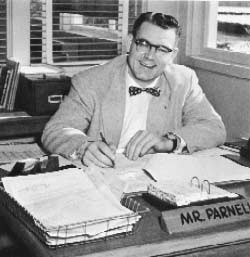
Dale Parnell
Principal of Springfield High School
Springfield, Oregon, 1959
Photo courtesy of Springfield High School |
Dale Parnell was principal of Springfield High School in 1959 when he recognized he had little to offer students in his district who needed vocational training. "It was clear we needed something between the high schools and the univeristy," Parnell recalls. When he became superintendent of the Lane Intermediate Education District, Parnell used that position as an opportunity to advocate starting a community college.
In 1959 the Oregon Legislative Assembly passed a comprehensive community college bill which spelled out the concept of a comprehensive community college that offered college courses, adult education, vocational training, developmental education, and counseling.
The Legislative Assembly enacted legislation in 1961 to increase allocations for construction of community college buildings. "We couldn't have started a college without that funding," Parnell says. Ten community colleges were founded in Oregon during the 1960s. |
|
Roots
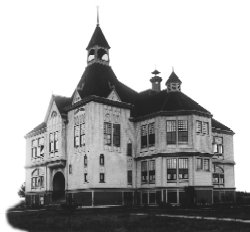
Geary School in Eugene (c. 1900)
reopened as Eugene Vocational School
in 1938
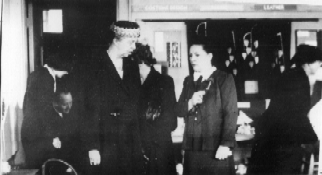
Eleanor Roosevelt with Lillian VanLoan,
director of Eugene Vocational School
c. 1940
|
Eugene Vocational School (EVS), founded in 1938 and operated by Eugene School District 4-J, had earned a reputation as a state model for vocational education.
In 1958 the name of the school was changed to Eugene Technical- Vocational School (ETVS) to reflect the addition of more technologically oriented courses to its curriculum which included evening adult education in addition to vocational courses. However, it was able to serve only a few hundred students in Eugene.
Lillian VanLoan was the first director of EVS and, according to Dale Parnell, her early influence was crucial to the successful formation of a community college. "What a dynamo! She had the vision for an institution to train vocational students in Eugene in 1938. She deserves credit for laying the early groundwork."
|
Community Support
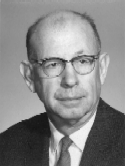
Bill Cox
|
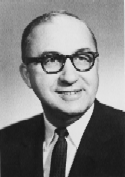
Millard Pond |
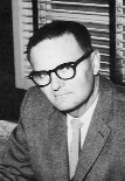
Walter Commons
|
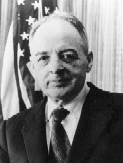
Arthur Flemming |
|
Support for the formation of a community college was strong throughout Eugene, Springfield, and Lane County.
Bill Cox, director of ETVS, 1949-1965, agreed with Dale Parnell's suggestion to make ETVS a regional institution. Cox saw the advantages that a community college would give vocational education: better and larger facilities, staff; and finnacing; updated programs and equipment; and a higher status.
Millard Pond, superintendent of Eugene School District 4J, and Walter Commons, superintendent of Springfield School District, were also strong supporters whose influence was crucial to the community college.
Arthur F. Flemming, president of the University of Oregon, wrote a letter supporting the idea of a community college in May 1964, "I feel a community college could be of great benefit to the university as it could be a complementary institution which would undoubtedly strengthen the edcuational climate in Lane County and the state."
The proposed community college also received strong community support from the Eugene-Springfield Metropolitan Civic Club which answered the question posed in its research report "Is There a Need for a Community College in Lane County Area?" with a resounding "yes" and recommended that its membership support the college.
News media coverage was also extensive and very positive.
|
Vote 5-1 for College
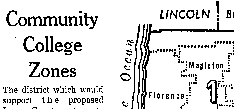
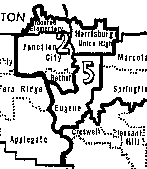
Lane Community College District Zones
Eugene Register-Guard, October 18, 1964
Large image of map
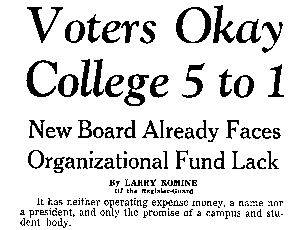
Article about election that approved
the formation of Lane Community College
Eugene Register-Guard, October 20, 1965
Large copy of article |
Before the matter of a new college could be brought to a vote of the people, a great deal of preparation, coordinated by Bert Dotson, was required.
In 1964 a study committee was formed, public hearings were held, and proposed district boundaries and board member zones were established. The proposed college district stretched from the Pacific Ocean to the Cascade Mountains and included most of Lane County and small portions of Benton, Linn, and Douglas Counties.
The state board of education scheduled an election for Monday, October 19, 1964. On election day voter turnout was low, and the college was the only thing on the ballot, but formation of the college district was approved 5,944 to 1,282.
On the same ballot, the seven-member charter Board of Directors (later named Board of Education) was elected. All those elected to the board had advocated a comprehensive curriculum for the new college, to include not only technical- vocational programs but also lower division college courses, adult education, developmental education, counseling, and cultural activities.
|
|












